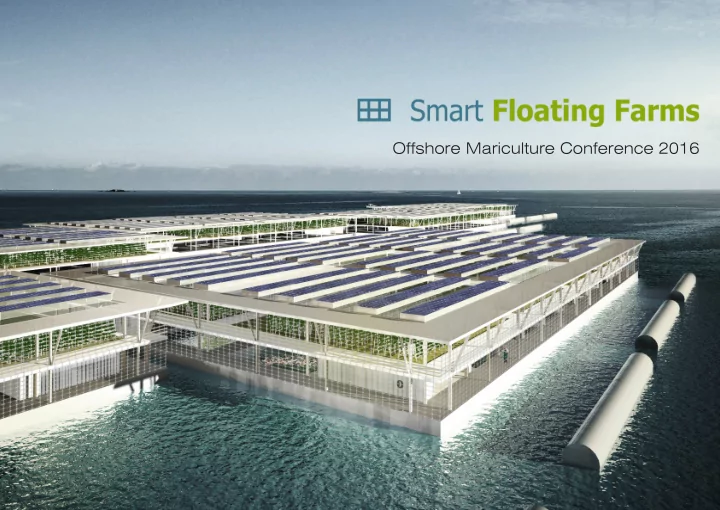

Offshore Mariculture Conference 2016
2050= 9.3 Billion people We have destroyed land and produced Climate change
Consuming resources and arable land...On the other hand, we have plenty of water space that we could transform into a productive tissue...
25 since out of 35 world Megacities have a physical access to water (seas, lakes or rivers)
FROM IMPORTER-CONSUMER LOCAL PRODUCERS / QUALITY CONTROLLERS (SFF) Direct %imports
Why? - Megacities fast growing pace & population - By 2030, food demand is predicted to increase by 50%(70% by 2050) - United Nations - Increased wealth and shifting diets - Avoid huge amount of food imports + reducing food mileage(i.e US imports 90% of consumed seafood, Gulf region 90% or Singapore imports 90%(AVA) - Limited land availability(land scarce) and land premium prices - A more controlled, cleaner and sustainable farming aquaculture high volume production and aquaponics - Year-round high yield production, not depending on external/weather conditions - Guarantee local food quality control
Inspired by the traditional Fish Farms grid confjguration
View of a cluster formed by 6 modules of the project, a productive arrangement
A combination of different existing technologies available in the market into a single Floating farm module
Roof level Photovoltaic / CSP solar power plant. towards self-suffjciency
Middle Level Crops-Production
Some Products examples for a potential Market (Crops type could vary according to the project geographical location) Leafy Greens Kang Kong (Water Lettuce Chinese Xiao Bai Cai Bayam Cai Xin Gai Lan Nai Bai Cabbage spinach) Spinach) Vegetables Artichokes Asparagus Beans Beats Broccoliinach) Brussels sprouts Cucumbers Eggplant Leeks Onions Peas Radishes Rhubarb Tomatoesnach) Bell peppers Fruits Rasperberries Watermelon Strawberries Blueberries Blackberriesch) Herbs Balis Arugula Chervil Chives Corianderach) Dill Lemon grass Mache Majoram Peppermint Sage Tarragon Thyme Rosemary Fish Groupers Seabass Milkfish Tuskfishnach) Snappers
In optimal conditions, one single module of 200 X 350 Lower level m footprint could annually produce 8.152 tons of fresh Fish Farms vegetables and 1.703 tons of fjsh. The project has a positive NPV and payback periods of around 6-8 years. Aim of an Integrated Multi-Trophic Aquaculture (IMTA)
Maybe this can be a small contribution to the overall problem, but in my thinking other complementary ways to traditional ways of production need to be tested, the sooner the better.
“Learn from yesterday, live for today, hope for tomorrow. The important thing is not to stop questioning” Albert Einstein
www.smartfmoatingfarms.com
Recommend
More recommend